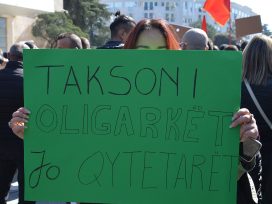Georgian nightmare
The current regime in Tbilisi – nominally led by Irakli Garibashvili but with oligarch Bidzina Ivanishvili pulling the strings – marks a sea change in Georgia’s gradual pro-western path of development over the past thirty years. For all the faults of past governments, there is no precedent for the authoritarian turn underway since 2020.
Volker Weichsel: In the weeks following Moscow’s invasion of Ukraine, Georgia was thought to be the next possible victim of Russian aggression. Since then, the country has dropped out of sight. What is the domestic political situation in Georgia, particularly the relationship between government and opposition and the position of civil society?
Zaal Andronikashvili: Georgia is deeply divided, and not just along a single rift. On the one hand, there is an extreme polarisation between government and opposition. On the other hand, there are major differences between the entire political class and civil society, which is western-oriented.
Georgia has taken massive steps backwards in terms of democracy since 2020. The OSCE concluded that while the parliamentary elections in autumn 2020 were technically competitive and free, pervasive allegations of pressure on voters and the blurring of the line between the ruling party and the state reduced public confidence in the process. The problem is that OSCE’s assessment of the voting itself was taken Georgian authorities as a clean bill of health. But the OSCE had also reported that the electoral law in Georgia creates structurally unequal conditions, and that the methods used by the regime during the campaign were utterly unfair. These criticisms were ignored.
During the elections the distinction between the oligarch Bidzina Ivanishvili’s Georgian Dream party – in power since 2012 – and the state authorities did indeed become thoroughly blurred. Following street protests and under pressure from the EU and the US, an amendment to the electoral law had been passed in June 2020, limiting the number of MPs elected by first-past-the-post to 30 out of 150. Even then, Georgian Dream won another absolute majority. Ivanishvili retired from politics in early 2021, as he said he had done between 2013 and 2018. In fact, he continues to set the agenda for Georgian domestic and foreign policy. The prime minister, Irakli Garibashvili, is a mere placeholder. One should not speak of the Gharibashvili government, which runs things in name only, but rather the Ivanishvili regime.
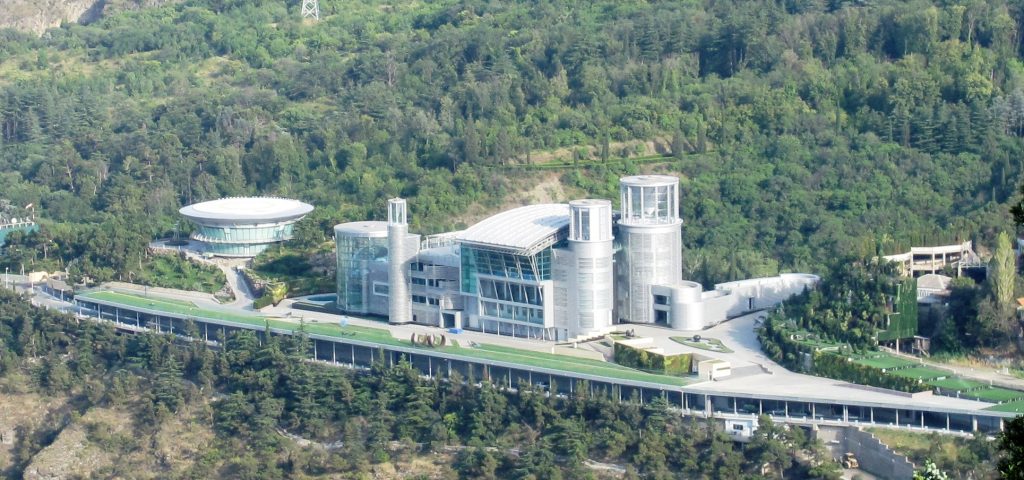
The residence of Bidzina Ivanishvili in Tbilisi. Author: Kober; Source: Wikimedia Commons
What has happened in the past two years?
The political opposition and critical civil society have been subjected to constant demonisation by Ivanishvili’s propaganda media. Ivanishvili is behind the largest TV channel, Imedi; the channel Rustavi 2; and the pro-Russia propaganda channel Post-TV. Media which is not close to the regime struggles with harassment and funding problems. The director of the largest opposition television station is in prison, for political reasons. Former president Mikheil Saakashvili has also been in prison since October 2021. Questions aside of whether there are legitimate grounds for his detention, the circumstances gave the Parliamentary Assembly of the Council of Europe grounds in October 2022 to describe Saakashvili as a political prisoner and to call for his release .
In many areas – from foreign policy to culture – a process of subordination has taken place. Independent professionals and competent specialists have been dismissed and replaced by compliant party cadres. Whenever there is a protest, demonstrators are harassed by right-wing thugs and handed heavy fines by Ivanishvili’s justice system. Officially the regime says that it is aiming at membership of the EU and NATO, but the reforms that this would require are not being carried out. The reason is that they would jeopardise Ivanishvili’s untrammelled power.
How would you characterise the political order in Georgia? How has it developed over the past 30 years, in what phases and along which lines?
As in all other successor states of the Soviet Union – except for the Baltic states – there was no successful re-foundation of the state in Georgia after the collapse of the USSR. Georgia became independent, but the power structure remained unchanged. There is a democratic façade and a formal separation of powers – but in fact the country has been ruled by a series of one-party regimes for the past 30 years, all relying on excessive police violence. Whether it was Zviad Gamsakhurdia’s Round Table–Free Georgia in the early 1990s, Shevardnadze’s Union of Citizens of Georgia in 1992–2003, Saakashvili’s United National Movement from 2003–2012 or Ivanishvili’s Georgian Dream: the power structure established by each of them was always the same, regardless of their political differences and mutual hostilities. In all cases, the ruling party has dominated not only the executive, but also the legislature, the judiciary and large parts of the economy and the media.
Despite all the problems, progress was always made during the first three regimes: whether national independence under Gamsakhurdia or the adoption of a new constitution under Shevardnadze, together with domestic stabilisation after the civil war, a strengthening of the currency, and Georgia’s anchoring on the international stage. Saakashvili also monopolised power, especially in his second term. But the fight against corruption, the reform of the police and the significant improvement of public services – these were all part of the rapid modernisation of the country, for which Saakashvili was responsible. This period was also one of strong ties with the USA.
These rulers were first and foremost politicians, and each had a political programme, whatever one’s opinion of it might be. Ivanishvili, on the other hand, is an oligarch. He made his fortune under shady circumstances in Russia in the 1990s. The record shows that he always places his private interests above those of the citizens or the state. Georgia has been controlled by oligarchic capital since 2012. Ivanishvili’s private assets comprise one third of Georgia’s gross domestic product. He has hijacked the state and turned Georgia into an oligarchy, or more precisely, into an autocratic plutocracy.
What does this mean for the country’s foreign policy?
In all former Soviet states, the nature of the regime determines foreign policy. The more authoritarian the regime becomes, even totalitarian, the further it leans towards Russia. Belarus is only the most extreme example. In Georgia, too, a shift is underway. Despite all the problems and oscillations, Shevardnadze and Saakashvili basically oriented Georgia towards the West. This was not simply an economic or security policy calculation: it expressed a desire to build a democratic constitutional state, in other words, a constitutional order very different from that which prevails in Russia – or in Iran, which is also not far from Georgia.
This orientation has been supported by an absolute majority of Georgians for 30 years. Now Ivanishvili is challenging that consensus. Back in 2013, he said that Armenian foreign policy, with its orientation towards both the West and Russia, was a good example for Georgia. What he did not say was that this policy had seen Armenia become increasingly dependent upon Russia.
Under the Ivanishvili regime, economic relations with Russia have been steadily growing since 2012. The same goes for political ties with Moscow, which Ivanishvili also set out to deepen. But when in June 2019 a deputy of the Russian State Duma, Sergei Gavrilov of the Communist Party, chaired a session of the Orthodox Inter-Parliamentary Assembly in the Georgian parliament, using the Russian language and sitting in the speaker’s chair, it gave out such a clear signal that spontaneous mass protests ensued. The protests were put down with disproportionate police violence, but both the speaker of the parliament, Irakli Kobakhidze of Georgian Dream, and the organiser of the meeting, Zakaria Kutsnashvili, also a member of Ivanishvili’s party, resigned.
The ruling party promised to reform the electoral law, in which a mixed system clearly gave the incumbent party an advantage. But this promise was not kept. After an orchestrated revolt within Georgian Dream, it merely reduced the number of direct mandate constituencies, instead of abolishing them completely. Direct candidates are mostly loyal party functionaries or business bosses, who use their parliamentary seat to lobby for their interests. Even if an opposition party gains a majority in the proportional component, direct candidates almost always win in their constituencies because of voter manipulation. Even after the reforms, this means that the incumbent government can win enough seats to rule alone.
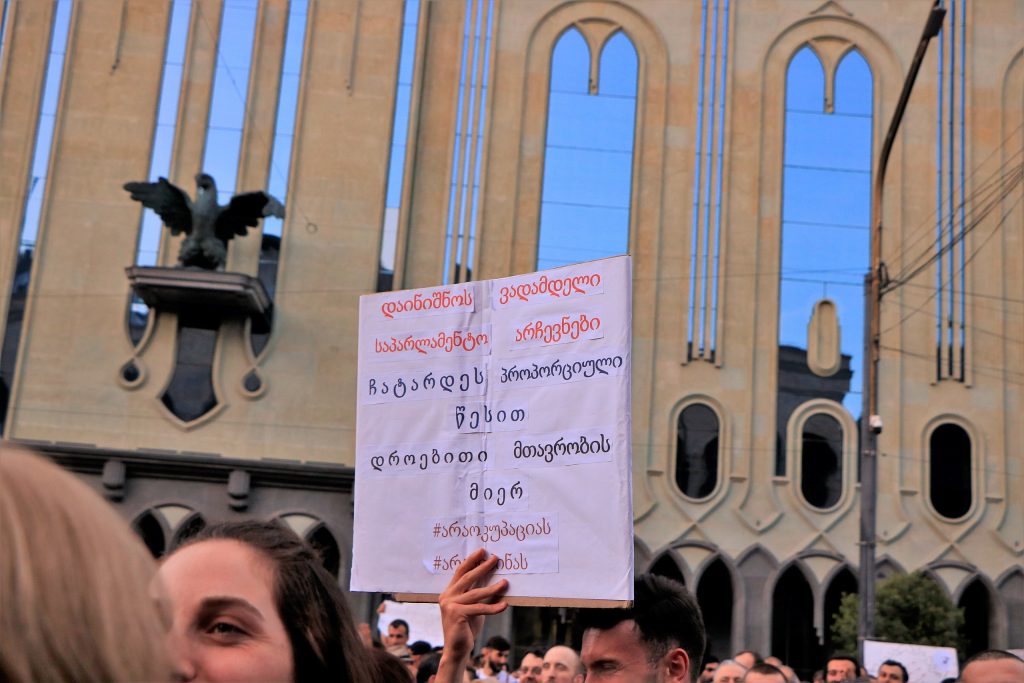
The ‘Gavrilov’s Night’ protests outside the parliament building in Tbilisi, June 2019. The sign reads: ‘We demand early parliamentary elections! They should be conducted in a proportional system by an interim government.’ Author: George Melashvili; source: Wikimedia Commons.
Instead of the promised judicial reform, which was supposed to lead to more independence for judges, the judiciary was completely subjugated. Since the summer of 2020, Georgia has been in a state of permanent political crisis. Not even the personal attempts to mediate by the European Council president Charles Michel in the summer of 2021 were able to resolve it.
The bitter result of these political developments was that Georgia – once a pioneer of democratic reforms in the post-Soviet space – was refused EU candidate status by the European Council in June 2022, while the candidacy of Ukraine and Moldova was accepted. The Council resolved that candidate status, which Georgia had applied for immediately after Russia’s invasion of Ukraine, would be considered only if Georgia implements a series of reforms to promote democracy and the rule of law. It is doubtful, to say the least, whether the Ivanishvili regime will carry these out.
How has Georgia acted towards Russia and Ukraine since the start of the war?
The regime has been sitting on the fence. It votes in favour of all international resolutions against Russia, such as the resolution in the UN General Assembly in October 2022 to refuse to recognise the Ukrainian regions annexed by Russia. However, the hallmark of Georgian Dream has long been its policy of de-escalation towards Moscow. This has its roots in the August War of 2008. Both the government and the president, Salome Zurabishvili, subscribe to the Moscow line that then-president Saakashvili started the war.
At the latest since 24 February 2022, western European governments have come to see through the claim that Russia was provoked in 2008. But Georgian Dream has stuck to its story, and to what it sees as a policy of de-escalation. Relations with Ukraine have been cool for many years as a result. In 2008, Georgia received air defence systems from Ukraine. But shortly after the Russian invasion, Garibashvili suggested that Ukraine was to blame for the war because, unlike Georgia, it had not pursued a policy of responsible de-escalation.
A week after the invasion began, Kyiv summoned its ambassador in Tbilisi for discussions. In August, there was a heated exchange between the parliamentary leader of Zelensky’s Servant of the People party, Davyd Arachamia, who has Georgian roots, and Archil Talakvadze, deputy speaker of the Georgian parliament and a member of Georgian Dream. These were a purely rhetorical skirmishes; more important is the fact that the Garibashvili government still refuses to go along with the EU’s sanctions against Russia.
This official position is in blatant contradiction to how large parts of Georgian civil society think and act. People are collecting donations and sending humanitarian aid. A Georgian volunteer battalion is fighting on Kyiv’s side in Ukraine. A great many Georgians see the war in Ukraine as their own. Public opinion in Georgia sees Ukraine as fighting for the freedom of Georgia and all the other successor states of the former Soviet Union. But Ivanishvili’s party – in particular, the former parliamentary speaker Irakli Kobakhidze – denounces Ukraine’s supporters as warmongers, who they claim want to open a second front in Georgia and attack Russia from the south.
Is it fear of the bigger neighbour after the traumatic experiences of 2008 that mainly shapes Georgian politics?
No! This argument is being instrumentalised. It still had some plausibility in the domestic dispute with Saakasvhili before the 2012 elections. Even after 2014, Georgian Dream could point out that a Saakashvili-style policy of confrontation with Moscow would cause problems with the European Union, since important member states such as Germany and France were pursuing a completely different policy towards Russia.
Since the escalation in Georgia’s domestic political situation in 2020, this already weak argument has become obsolete. Rapprochement with Russia serves to consolidate the regime’s authoritarian rule, which is being challenged by civil society, and blocks closer ties with the EU. The Ivanishvili regime uses arguments about security, or rather accuses its critics of gambling with national security, to shore up its own unlimited power. It values its own power over Georgia’s long-term interests and the will of an absolute majority of its population.
This campaign is being waged by through the parliamentary grouping known as The Power of the People, which is said to have split from the Ivanishvili Party. It is equipped with a populist pro-Russia propaganda channel, Post-TV, which broadcasts anti-western talking points. This group of MPs verbally attack western diplomats, agitate against what they call western pseudo-values, and inveigh against ‘liberals’ and ‘liberalism’. It is the same rhetoric that one hears from Russian state television and lately also from the Kremlin leader’s mouth
This is a substantial change from anything that Georgia has seen in the last 30 years. For all the Georgian state’s failings in terms of democracy and rule of law, which were only half-heartedly dealt with in the last two decades, the overall direction was right. But what the Ivanishvili regime, in the form of prime minister Garibashvili, has been doing since 2020 – from Georgian Dream MPs to satellites like the Power of the People grouping – has gone in the opposite direction. Democracy, human rights, minority rights, and the individual rights of members of many different social groups are being attacked in the name of ‘Georgian values’. These groups are said to be alien to the Georgian nation. A culture war is being deliberately fomented at the expense of minorities, so as to dissuade Georgians from supporting the country’s western tendency, since this inevitably entails a restriction of the regime’s absolute power.
Does the question of Abkhazia and South Ossetia still play a role in Georgia’s relationship with Russia?
A secondary one at most. Some small opposition parties have tried to use the war in Ukraine as a means of reviving the Abkhazia issue. There was an initiative with the slogan ‘before Bucha there was Abkhazia’. But obscuring Georgia’s responsibility in the Abkhaz war of 1992–93 will not change policy towards Abkhazia. Tbilisi has not been working seriously to change the status quo since the Shevardnadze era.
The same goes for the situation in South Ossetia since 2008. The only thing that could alter that situation would be a change in the entire power structure of the post-Soviet space, as the result of a massive weakening of Russia in the course of its war in Ukraine. The problem is that neither the government in Tbilisi nor the opposition parties are preparing for any such change. If a geopolitical upheaval of this kind does occur, they will not have a reasonable, peaceful policy towards Abkhazia and South Ossetia in place.
What influence does the foreign policy environment have on domestic politics?
Shevardnadze’s personal friendship with Hans-Dietrich Genscher or James Baker gave Georgia great, perhaps even disproportionate, visibility. Saakashvili and his apparatus had a very good personal connection to US politics, especially to the administration of George W. Bush. In those days, Georgia could count on US support. Georgian Dream has none of that. Under Barack Obama, Georgia played no role at all for the US, while Donald Trump even cut back on America’s traditionally substantial support for Georgian civil society.
Since 2012 at the latest, the European Union has had no clear Georgia policy. The same goes for Germany. For Angela Merkel, Georgia – like Ukraine – was if anything a disturbance to relations with Russia. This led to great frustration in Georgia, especially in civil society and among those who had supported preparations for accession to the EU and NATO. It has given opponents of the EU and supporters of rapprochement with Russia an opportunity to claim that the West has betrayed Georgia.
Even after 24 February 2022, there has been little change. Will the EU ignore the current state of democracy in Georgia and accept Georgia’s accession for geopolitical reasons? Or will it insist on its standards and risk making EU accession seem so unattainable that even its Georgian supporters give up on it? The dilemma is obvious, but so is the fact that Ivanishvili is using as a bargaining chip in relations with the EU and the USA, while cementing his authoritarian power in Georgia.
Instead of prevaricating and letting itself be manipulated, the EU should make a clear decision: for Georgia and for democracy. It is a myth that only one of the two is possible; but the danger of losing both is very real. What is needed are clear commitments to EU accession, systematic and transparent monitoring of the reforms needed, and stronger support for civil society.
Relations between Russia and the other post-Soviet states have been considered through the post-colonial paradigm for some time, and all the more so since the invasion of Ukraine. What are the political reasons for the popularity of this concept, and what are its strengths and weaknesses?
In Georgia, the concept is not yet particularly popular. Its fundamental appeal is that it allows the conflicts between the post-Soviet states and Moscow to be subsumed under a pattern of interpretation widespread in the West. The main addressee is the western left, which either isn’t interested in the post-Soviet space at all, or looks only towards Moscow. At the same time, it allows the concept of national liberation to be framed as leftwing and progressive rather than rightwing and reactionary.
But interpreting the Soviet Union and post-Soviet relations between Russia and other former republics of the USSR through the postcolonial paradigm is problematic. To call the USSR a colonial empire would be to stretch the concept too far. Even the Russian Empire before 1917 was not a colonial empire in the usual sense.
The British empire, for example, focused primarily on economic exploitation, while for Russia political calculations took – and still take – precedence over economic ones. The conquest of the Caucasus, for example, cost the tsars much more than it brought in. There are also many differences to western-style colonialism in terms of cultural relations between the centre and the periphery. The relationship between Russia and Georgia did not involve the kind of cultural hegemony exercised by western Europe over colonised societies. Moscow had absolute political dominance in the 19th century and for long periods of the 20th, but on the cultural level Georgian society preserved and consolidated its autonomy. This was the precondition for the failed attempt at nation-building after 1917 and the successful creation of a Georgian state in 1991.
The differences to the western colonial empires are obvious: Russia did not arrive at far-flung parts of the world because of technical advances in seafaring. The relationship between the various centres of power in the Russian Empire at its height – integration and disintegration, conflict and cooperation, subjugation and liberation, asymmetry and symmetry – cannot be equated with the relations between the western European nations and their overseas colonies between the 16th and 20th centuries.
Georgia has a Christian culture whose origins are older than those of Russian Orthodoxy, although the two share common roots. How can this be seen through the same lens as relationships between the British or French missionaries and the people they encountered in Africa? And there is also a political problem: the postcolonial paradigm has an anti-western thrust in Europe and the USA. It is directed against European and American modernity. How does such a paradigm fit with the national emancipation of Ukraine or Georgia from Moscow, given that ‘the West’ – i.e. Europe and the USA – have been role models in this process?
In his speech after the annexation of the occupied territories in Ukraine in September 2022, Putin explicitly stated that Russia is the protector of all peoples colonised by the western states, past and present, and is the bringer of sovereign democracy and freedom from the colonial yoke. What do you say to that?
The Putin regime is trying to mobilise anti-western, anti-American and anti-capitalist forces all over the world – not least in the West itself. Unfortunately, there are still many leftwing intellectuals who know little about the history of the Russian Empire, the Soviet Union and the post-Soviet states. They have no idea about the oppressive machine that the Putin regime is; how it persecutes and attacks all those in Russia’s neighbourhood who demand social and national rights. The invasion of Ukraine has made this horrifyingly clear. Russia is deliberately attacking civilian infrastructure; it has established a regime of terror in the occupied territories; torture and rape are everyday occurrences there.
In Russia itself, the people who are mobilised for the war are the ones who cannot protect themselves or buy their way out. By and large, that means people from the country’s non-Russian peripheries, and from the poorest strata of society. Similarly, at the global level, there is no sense in which Russia is an anti-colonial power. On the contrary, it is a state that benefits from deepening inequality and oppression. Its entire foreign policy is aimed at fomenting conflict in order to weaken the West. Russia’s most important partners are authoritarian and totalitarian states: Belarus, China, North Korea, Iran and Syria. And it is no coincidence that Russia supports and finances far-right movements in western Europe and elsewhere.
This article was published with the support of the Zeit Stiftung.
Published 30 January 2023
Original in German
Translated by
Edward Maltby
First published by Osteuropa 9–10/2022 (German version); Eurozine (English version)
Contributed by Osteuropa © Osteuropa / Zaal Andronikashvili / Volker Weichsel / Eurozine
PDF/PRINTPublished in
In collaboration with
In focal points
- The end of Tunisia’s spring?
- Protecting nature, empowering people
- Albania: Obstructed democracy
- Romania: Propaganda into votes
- The myth of sudden death
- Hungary: From housing justice to municipal opposition
- Czech Republic: Velvet contradictions
- Armenia: Light in the dark?
- Moldova: End of the experiment?
- Serbia: Setting sail for Brussels, tying up in Moscow
Newsletter
Subscribe to know what’s worth thinking about.
Related Articles
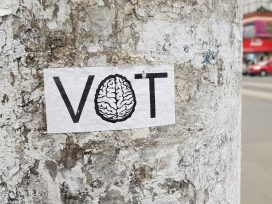
Romania’s anti-vax movement has mutated into a pro-Russian protest bloc. Representing a politically disenchanted online public, the far-right Alliance for the Union of Romanians is increasingly influencing the mainstream agenda.
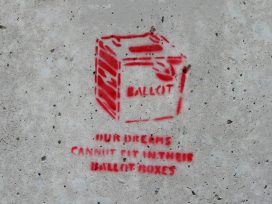
Although it makes for a great dramatic effect, the theories of the sudden death of democracy disregard the gradual erosion and capture of institutions, and the role of the populace – argues political scientist John Keane.






